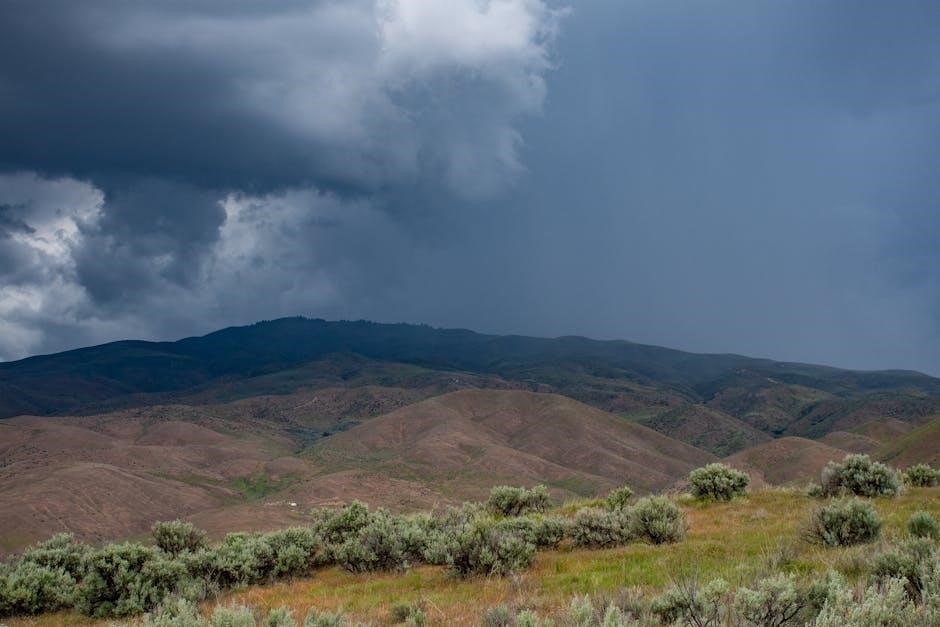Overview of a Colorado Last Will and Testament
A Colorado Last Will and Testament is a legal document outlining asset distribution after death. It allows individuals to appoint executors, name guardians, and ensure wishes are honored, preventing intestacy disputes.
1.1 Definition and Purpose
A Colorado Last Will and Testament is a legally binding document that outlines how an individual’s assets, property, and possessions should be distributed after their death. Its primary purpose is to ensure that the deceased person’s wishes are carried out regarding the division of their estate. This document also allows the testator (the person creating the will) to appoint an executor, who is responsible for managing the estate and carrying out the instructions outlined in the will. Additionally, it provides an opportunity to name guardians for minor children and specify funeral arrangements. Having a will in place helps avoid disputes among heirs and ensures that the estate is handled according to the testator’s intentions, rather than being subject to Colorado’s intestacy laws.
1.2 Importance of Having a Will in Colorado

Having a Last Will and Testament in Colorado is crucial for ensuring that one’s assets, property, and personal belongings are distributed according to their wishes after death. Without a will, the estate is subject to Colorado’s intestacy laws, which may not align with the deceased person’s intentions. A will allows individuals to designate an executor to manage their estate, name guardians for minor children, and specify funeral arrangements. It also helps prevent disputes among heirs and ensures that specific assets go to intended beneficiaries. Additionally, having a will can streamline the probate process, reduce legal complications, and provide peace of mind knowing that one’s affairs are in order. A will is a foundational document for anyone wishing to maintain control over their legacy.
1.3 What to Include in a Colorado Last Will and Testament
A Colorado Last Will and Testament should include key elements to ensure clarity and legality. First, the testator must clearly state their intent to create a will and revoke any prior versions. They should name a primary and alternate executor to manage the estate. Beneficiaries must be designated, specifying who inherits which assets, properties, or personal items. If there are minor children, guardianship arrangements should be outlined. Funeral preferences or instructions for final arrangements may also be included. Debts and taxes should be addressed, ensuring the estate can cover these obligations. Specific bequests, such as gifts to charities or individuals, should be detailed. Finally, the will must be signed by the testator and witnessed properly to meet Colorado’s legal requirements.

Legal Requirements for a Valid Will in Colorado

A valid Colorado will must be in writing, signed by the testator, and witnessed by two individuals. The testator must be at least 18 years old.
2.1 Who Can Make a Will in Colorado?
In Colorado, any individual who is at least 18 years old and of sound mind can create a valid will. This includes residents and non-residents. The testator must have the legal capacity to understand the nature of their actions and the extent of their property. Minors, typically those under 18, are generally not allowed to make a will unless they are legally emancipated or meet specific court-approved circumstances. The law aims to ensure that the person creating the will can make informed decisions about their estate. This requirement helps prevent fraud or undue influence, ensuring the will reflects the individual’s true intentions.
2.2 Signature Requirements
In Colorado, a will must be signed by the testator (the person creating the will) to be valid. The signature must be in writing and made in the presence of at least two witnesses. The testator should sign their full legal name, and the signature must be placed at the end of the document; If the testator is unable to sign their name due to disability, another person may sign on their behalf, but this must be done at the testator’s direction and in their presence. The witnesses will also sign the document, affirming they witnessed the testator’s signature; Proper signing ensures the will’s authenticity and validity under Colorado law. Failure to meet these requirements can render the will invalid.
2.3 Witness Requirements
In Colorado, a valid will must be witnessed by at least two individuals who are at least 18 years old and mentally competent. Witnesses must observe the testator signing the document or acknowledge the testator’s signature if it was already made. The witnesses then sign the will in the testator’s presence, confirming they witnessed the act. Witnesses should ideally be disinterested parties, meaning they are not beneficiaries under the will, to avoid potential conflicts or legal challenges. Colorado law does not automatically invalidate a will if a beneficiary witnesses it, but it is generally recommended to avoid such situations to prevent disputes. Proper witnessing ensures the will’s validity and adherence to state law.
2.4 Notarization in Colorado
In Colorado, notarization of a will is not strictly required for it to be valid, but it is highly recommended. A notarized will, often referred to as a “self-proving will,” can simplify the probate process by providing prima facie evidence of the will’s authenticity. To notarize, the testator must sign the will in the presence of a notary public, who then acknowledges the signature and affixes their official seal. This step ensures the will is executed properly and reduces the likelihood of disputes. While Colorado law does not mandate notarization, it is a prudent step to ensure the document’s validity and streamline estate administration. Proper notarization aligns with best practices for estate planning in Colorado.
Colorado-Specific Considerations
Colorado-specific considerations in estate planning include understanding state probate laws, intestacy rules, spousal rights, and exemptions. These factors ensure proper distribution of assets according to local regulations.
3.1 Colorado Probate Laws

Colorado probate laws govern the legal process of administering a deceased person’s estate. The process ensures assets are distributed according to the will or state intestacy laws. Probate typically involves validating the will, inventorying assets, paying debts, and distributing remaining assets to beneficiaries. In Colorado, probate can be formal or informal, depending on the estate’s complexity. Small estates may qualify for simplified procedures, reducing costs and time. The court oversees the process to ensure fairness and compliance with state regulations. Understanding Colorado’s probate laws is essential for executors and beneficiaries to navigate the estate settlement efficiently. Proper planning, including a valid will, can streamline the probate process and minimize delays.
3.2 Intestacy Laws in Colorado
Colorado intestacy laws determine how assets are distributed when someone dies without a valid will. These laws prioritize the deceased’s spouse and children, ensuring they receive the majority of the estate. If there is no spouse or children, assets pass to parents, siblings, or other relatives in a specific order. If no heirs are found, the estate goes to the state. Intestacy laws aim to reflect how the deceased might have distributed their assets. However, without a will, the distribution may not align with the person’s wishes. Understanding Colorado’s intestacy laws is crucial for those without a will, as it outlines the default estate distribution process.
3.3 Spousal Rights in Colorado
In Colorado, spousal rights are protected under estate planning laws, ensuring a spouse receives a fair share of the estate. The state follows the concept of the “augmented estate,” which includes marital property and gifts made during the marriage. A spouse is entitled to an elective share or statutory entitlement, preventing complete disinheritance unless legally waived, typically through a prenuptial agreement. Spouses also have rights to exemptions or allowances, providing financial support. These protections ensure a spouse is not left without resources. Consulting an estate planning attorney is crucial to navigate these rights effectively, ensuring all legal aspects are appropriately addressed.
3.4 Exemptions and Allowances
In Colorado, certain exemptions and allowances are designed to protect heirs and beneficiaries from financial hardship. The homestead exemption shields a primary residence from creditors, ensuring a surviving spouse or minor children retain a place to live. Additionally, Colorado law provides for a family allowance, granting the spouse and minor children a reasonable sum for living expenses during the estate settlement. These allowances are prioritized over other claims, ensuring immediate financial support. Specific dollar amounts are set by state law to determine the extent of these protections. Consulting an estate planning attorney helps ensure these provisions are properly addressed in the will, aligning with Colorado’s legal framework for estate distribution.
DIY Will Kits and Templates
Colorado DIY will kits and templates offer affordable, accessible tools for creating a last will and testament. Available online or in stores, they provide structured formats for clear instructions.
4.1 Availability of PDF Templates
Colorado last will and testament PDF templates are widely available online, offering convenient and accessible tools for drafting a will. Legal websites, such as those offering estate planning resources, provide downloadable templates specifically designed for Colorado residents. These templates are often free or low-cost, making them an affordable option for individuals seeking to create a will without legal assistance. Many templates are pre-formatted to comply with Colorado state laws, ensuring that users can easily fill in their personal information and wishes. Additionally, some law firms and legal aid organizations provide PDF templates as a public service, further increasing accessibility. These resources are particularly useful for those with straightforward estate planning needs, though complex cases may still require professional guidance.
4.2 Using Online Will-Making Platforms
Online will-making platforms offer a streamlined way to create a Colorado last will and testament. These platforms provide interactive forms that guide users through the process, ensuring compliance with Colorado state laws. Many platforms, such as LegalZoom or Rocket Lawyer, feature templates specifically tailored to Colorado residents. Users can input their personal information, designate beneficiaries, and outline their wishes in a step-by-step format. These platforms often include tools for signing and witnessing, though users must still comply with Colorado’s legal requirements for execution. While convenient, it’s important to ensure the final document adheres to state-specific rules and is properly executed. For complex estates, consulting an attorney is recommended to avoid potential issues.

4.3 Pros and Cons of DIY Wills
DIY wills offer cost-effectiveness and convenience, allowing individuals to create a Colorado last will and testament from home. They provide a straightforward process for those with simple estates, ensuring basic wishes are documented. However, DIY wills may lack customization for complex situations, such as blended families or specific asset distributions. Improper execution or omissions can lead to legal challenges. While they are a practical option for many, DIY wills are not ideal for everyone, especially those with large estates or unique circumstances. Consulting an attorney is recommended for complex cases to ensure compliance with Colorado laws and avoid potential disputes. Balance convenience with legal security when choosing this method.
4.4 Ensuring Compliance with Colorado Laws
To ensure compliance with Colorado laws when using a DIY will, it is crucial to follow the state’s specific legal requirements. Colorado requires a will to be in writing, signed by the testator, and witnessed by two individuals. While notarization is not mandatory, it can make the will “self-proving,” simplifying the probate process. Adhering to these guidelines helps prevent legal challenges and ensures the will is valid. Using Colorado-specific templates or consulting a legal expert can further guarantee compliance. Failure to meet these standards may result in the will being contested or deemed invalid, leading to delays or disputes during probate. Always verify state laws and consider professional review to ensure your DIY will aligns with Colorado’s legal framework.
Common Mistakes to Avoid
Common mistakes include improper execution, unclear language, and failing to update the will. Ensure witnesses are present, and avoid handwritten changes or omitting key assets.

5.1 Improper Execution of the Will
Improper execution is a common mistake that can render a will invalid. In Colorado, a will must be signed by the testator in the presence of two witnesses, who must also sign the document. Witnesses must be adults of sound mind and cannot be beneficiaries under the will. Failing to meet these requirements can lead to legal challenges. Additionally, handwritten changes to the will (called codicils) must also follow proper execution procedures. Notarization, while not required in Colorado, can help prevent disputes by creating a self-proving will. Ensuring proper execution is critical to avoid complications during probate.
5.2 Incomplete or Unclear Wishes
Incomplete or unclear wishes in a Colorado Last Will and Testament can lead to confusion and disputes among beneficiaries. Vague language, such as “I leave everything to my family,” can result in legal challenges, as it does not specify how assets should be distributed. Similarly, failing to address all assets or omitting specific beneficiaries can create uncertainty. To avoid this, the will must clearly outline the distribution of property, name specific beneficiaries, and include contingency plans for unexpected circumstances. Using precise language and consulting with an attorney ensures that the testator’s intentions are clearly expressed and legally binding. Regularly reviewing and updating the will helps prevent ambiguities and aligns with Colorado’s legal standards.
5.3 Failure to Update the Will
Failure to update a Colorado Last Will and Testament can lead to unintended consequences, as significant life changes may render the document outdated. Events such as marriage, divorce, the birth of children, or the acquisition of new assets require revisions to ensure the will reflects current wishes. If not updated, the distribution of assets may not align with the testator’s intentions, potentially causing disputes among beneficiaries. Additionally, changes in Colorado laws or personal circumstances can affect the validity or enforceability of the will. Regular reviews and updates, especially after major life events, are essential to maintain its accuracy and ensure it complies with Colorado’s legal requirements. This helps prevent misunderstandings and guarantees the estate is managed according to the testator’s desires.
5.4 Not Considering Estate Taxes
Not considering estate taxes when creating a Colorado Last Will and Testament can result in significant financial burdens for beneficiaries. While Colorado does not impose a state estate tax, federal estate taxes may still apply for larger estates. Failing to account for these taxes can reduce the value of the estate and lead to unforeseen financial challenges. Proper estate planning, such as establishing trusts or utilizing tax-saving strategies, can help minimize tax liabilities. It is crucial to consult with an estate planning attorney to ensure the will addresses potential tax implications and maximizes the inheritance for loved ones. This oversight can have long-lasting financial consequences if not properly addressed.

Updating and Revoking a Will
Updating or revoking a will in Colorado ensures your wishes remain current and legally binding. Changes in life circumstances often require revisions to reflect new desires or situations. Proper legal steps must be followed to avoid disputes and maintain the document’s validity. Consulting an attorney is recommended to ensure compliance with Colorado state laws and to explore options like codicils for amendments or full revocation. Regular reviews and updates help safeguard your estate plan and provide peace of mind for you and your beneficiaries.
6.1 When to Update Your Will
Updating your Colorado Last Will and Testament is essential when life circumstances change. Key events include marriage, divorce, the birth or adoption of children, or the death of a spouse or beneficiary. Acquiring significant assets, such as property or investments, may also necessitate revisions. Relocation to a new state, like Colorado, requires ensuring your will complies with local laws. Changes in beneficiary designations, business ownership, or health conditions should also prompt a review. Additionally, if your executor or guardian can no longer serve, updates are needed. Finally, revisions to tax laws or personal wishes may require adjustments. Regular reviews, ideally every 5-10 years or after major life changes, ensure your will remains accurate and aligns with your current goals.
6.2 How to Revoke a Will in Colorado
In Colorado, a will can be revoked through specific legal methods. One common way is by creating a new will or codicil that explicitly revokes the previous document. This new document must be properly executed, following Colorado’s signature and witness requirements. Another method is physically destroying the will with the intent to revoke it, such as burning, tearing, or shredding it. This act must be done intentionally and can be witnessed to avoid disputes. If the testator later remarries, Colorado law may revoke certain provisions automatically. It’s advisable to consult an estate planning attorney to ensure the revocation is legally valid and aligns with Colorado’s probate laws.
6.3 Creating a Codicil
A codicil is a legal document used to make amendments or additions to an existing Colorado Last Will and Testament. To create a codicil, it must be in writing, signed by the testator, and witnessed by two individuals who meet Colorado’s witness requirements. The codicil should explicitly reference the original will and detail the specific changes to be made. While not required, notarization can provide additional validation. The codicil does not replace the original will but rather supplements it. It is essential to ensure the codicil complies with Colorado’s legal standards to maintain the validity of the will. Consulting an estate planning attorney is recommended to avoid potential legal complications and ensure clarity in the changes made.

Related Legal Documents
A comprehensive estate plan in Colorado often includes a Power of Attorney, Living Will, and Trusts, which complement a Last Will and Testament by addressing financial, healthcare, and asset management needs.
7.1 Power of Attorney
A Power of Attorney (POA) is a legal document that allows you to appoint someone to manage your financial, legal, and personal affairs if you become incapacitated. In Colorado, a POA can be durable, meaning it remains in effect even if you become mentally or physically unable to act, or springing, which only takes effect under specific conditions. A POA is essential for ensuring your wishes are carried out without court intervention. It complements a Last Will and Testament by addressing matters while you are still alive. Having both documents ensures comprehensive protection of your estate and personal well-being. A POA can be tailored to your needs, providing peace of mind for you and your loved ones.
7.2 Living Will and Advance Directives
A Living Will, also known as an Advance Directive, is a legal document that outlines your wishes for medical treatment if you become unable to communicate or make decisions for yourself. In Colorado, this document allows you to specify preferences for end-of-life care, including life-sustaining treatments. It ensures your healthcare providers and family know your desires, preventing conflicts and ensuring your autonomy is respected. Unlike a Last Will and Testament, a Living Will focuses solely on medical decisions during your lifetime. It is often paired with a Medical Durable Power of Attorney, which appoints someone to make healthcare decisions on your behalf. Having a Living Will provides peace of mind and clarity in difficult situations, aligning with Colorado’s respect for patient autonomy. It is a crucial component of a comprehensive estate plan, ensuring your wishes are honored even when you cannot express them.
7.3 Trusts and Their Role in Estate Planning
Trusts are legal arrangements that allow you to manage and distribute assets according to specific instructions, offering flexibility and control beyond a traditional Colorado Last Will and Testament. They enable you to transfer assets to beneficiaries during your lifetime or after death, bypassing probate in many cases. Common types include Revocable Living Trusts, which can be modified, and Irrevocable Trusts, which are permanent; Trusts can protect assets from creditors, minimize estate taxes, and ensure privacy, as they are not publicly recorded like wills. They are particularly useful for complex estates, special needs planning, or maintaining control over asset distribution. Trusts complement a Will, providing an additional layer of estate planning tailored to individual needs and goals.

Estate Planning in Colorado
Estate planning in Colorado ensures the orderly management and distribution of assets according to your wishes, minimizing taxes and probate delays while protecting your legacy for future generations.
8.1 What is Estate Planning?
Estate planning is the process of managing and distributing your assets according to your wishes after death or incapacity. It involves creating legal documents like a will, trusts, power of attorney, and beneficiary designations to ensure your property, finances, and personal wishes are protected and carried out. Estate planning also aims to minimize taxes, avoid probate, and provide clarity for your loved ones. In Colorado, estate planning is tailored to state-specific laws and regulations, ensuring that your plans are legally binding and meet local requirements. Proper planning safeguards your legacy and offers peace of mind for you and your family.
8.2 Components of a Comprehensive Estate Plan
A comprehensive estate plan in Colorado typically includes a Last Will and Testament, which outlines asset distribution and names an executor. It also involves trusts, such as revocable or irrevocable trusts, to manage assets and bypass probate. A Durable Power of Attorney designates someone to handle financial decisions if you become incapacitated. Additionally, a Living Will or advance directives specify healthcare preferences. Beneficiary designations for retirement accounts and life insurance policies are also crucial; Together, these components ensure your wishes are honored, assets are protected, and loved ones are guided through legal processes. A well-rounded plan adapts to your needs and complies with Colorado laws, providing peace of mind and financial security.
8.3 The Role of a Last Will and Testament in Estate Planning
A Last Will and Testament serves as the cornerstone of estate planning in Colorado, allowing individuals to dictate how their assets will be distributed after death. It enables the appointment of an executor to manage the estate and ensures that specific wishes are carried out. The Will also addresses guardianship for minor children and pets, providing clarity and direction. By having a Will, individuals can prevent disputes among heirs and ensure that their legacy aligns with their values. It complements other estate planning tools, such as trusts and powers of attorney, offering a structured approach to asset management and distribution. A well-drafted Will reduces legal complexities and provides peace of mind for both the individual and their loved ones.
A Colorado Last Will and Testament is essential for ensuring your wishes are honored and your estate is managed properly. Estate planning provides clarity, peace of mind, and legal protection for your loved ones. Consulting with an attorney guarantees compliance with Colorado laws and avoids potential disputes. Take control of your legacy today.
9.1 Final Thoughts on Creating a Colorado Last Will and Testament
Creating a Colorado Last Will and Testament is a crucial step in securing your legacy and ensuring your wishes are respected. It provides clarity, protects your loved ones, and guarantees your estate is distributed according to your preferences. While DIY templates offer convenience, consulting an attorney ensures compliance with Colorado laws and avoids costly errors. Regular updates are essential to reflect life changes, such as births, deaths, or marital status shifts. A well-crafted will safeguards your family’s future and offers peace of mind. Prioritize this vital document to maintain control over your estate and leave a lasting legacy.
9.2 Encouragement to Seek Professional Advice
While DIY will kits and templates provide a starting point, seeking professional advice ensures your Colorado Last Will and Testament is legally sound and tailored to your unique circumstances. An experienced estate planning attorney can guide you through complex decisions, such as asset distribution, tax implications, and guardianship arrangements. They can also help you navigate Colorado-specific laws, including probate and intestacy rules. A professional ensures your wishes are clearly expressed and legally binding, reducing the risk of disputes or misunderstandings. Investing in expert advice provides peace of mind, knowing your estate is managed according to your intentions. Consult an attorney to create a comprehensive and enforceable will.
